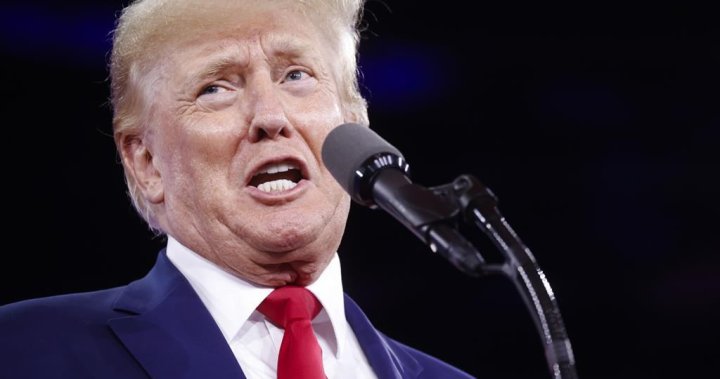Warrant used to search Trump’s home alleges concealing of evidence, other crimes – National | Globalnews.ca
The warrant used to search Donald Trump’s Mar-a-Lago estate this week suggests the former U.S. president is under investigation for concealing evidence by withholding official classified records, including some marked “top secret” that were ultimately recovered by FBI agents.
The document, unsealed Friday by a federal judge after Trump’s legal team declined to block its release, lists three federal laws Trump was alleged to have violated, including the Espionage Act, which outlaws the unauthorized holding of national security information that could aid a foreign adversary in harming the U.S.
The warrant seeks “all physical documents and records constituting evidence, contraband, fruits of crime, or other items illegally possessed” in violation of those laws.
A property receipt listing all items taken from Trump’s Palm Beach, Fla., home and political headquarters reveals FBI agents found and removed 11 sets of documents that were marked as “top secret” or classified during Monday’s search, along with several other materials.
The document provided few details of what was recovered. Among the items not considered classified or secret were a clemency order for Trump advisor Roger Stone and unspecified material relating to French President Emmanuel Macron, along with handwritten notes and photo binders.
Read more:
Donald Trump calls for ‘immediate’ release of Florida search warrant
In a statement Friday, Trump claimed that the documents seized by agents at his Florida club were “all declassified,” and argued that he would have turned over the documents to the U.S. Justice Department if asked.
While incumbent presidents have the power to declassify information, that authority lapses as soon as they leave office and it was not clear if the documents in question have ever been declassified. Trump also kept possession of the documents despite multiple requests from agencies, including the National Archives, to turn over presidential records in accordance with federal law.
Trump’s legal team filed notice shortly before a 3 p.m. ET deadline Friday advising the U.S. Justice Department it would not object to the warrant’s unsealing, which had been requested on Thursday. Trump had already stated publicly he would allow the document, as well as a receipt of items taken by FBI agents from his Florida home on Monday, to be made public.
Shortly after the Trump team’s filing, a federal judge in Florida ordered the warrant and property receipt to be unsealed.
The department asked a court for the warrant to be unsealed due to what Attorney General Merrick Garland said Thursday was “significant public interest” in the unprecedented search of a former president’s home.

Garland and the FBI have faced significant public and political pressure to reveal more about the search, which has sparked speculation on both sides of the political divide and a slew of attacks from Trump’s fellow Republicans.
Although warrants and other materials in an ongoing investigation are usually kept under seal, the move to make the documents public appeared to recognize the vacuum created by the agencies’ silence. Republicans have been fundraising off the search, which comes months before November’s midterm elections that will determine control of Congress.
The FBI and Justice Department have been investigating Trump’s withholding of presidential records —a federal crime if not cleared with the National Archives — since early this year. The National Archives had asked the department to investigate after saying 15 boxes of records it retrieved from the estate in February included classified records, and alleged Trump’s team had still not returned everything it had asked for.
Read more:
U.S. seeking to unseal warrant used to search Trump’s Mar-a-Lago estate, AG says
Monday’s search came three days after a federal judge in Florida signed off on the search warrant, which followed standard procedure by listing probable cause of crimes potentially committed by Trump and his team in retaining the materials. Garland confirmed Thursday that he had personally approved the request for the warrant, adding he did “not take such a decision lightly.”
The action immediately sparked condemnation from Republicans who accused Garland and President Joe Biden of weaponizing the Justice Department to hurt Trump, who is openly considering another run for the White House in 2024 but has yet to officially declare his candidacy.
Online death threats against Garland, FBI director Christopher Wray, FBI agents and the justice system at large increased after the search. A man was killed by police after attempting to breach an FBI field office in Ohio on Thursday, though officials have yet to say if the incident was sparked by the Mar-a-Lago search.
The property receipt and warrant released Friday also debunks some of the accusations thrown out by Trump and his allies, including that his lawyers were not present during the search or did not receive copies of the warrant and property receipt as required by law. Trump lawyer Christina Bobb’s signature is present on both pages of the property receipt.
With files from the Associated Press
© 2022 Global News, a division of Corus Entertainment Inc.
For all the latest world News Click Here


